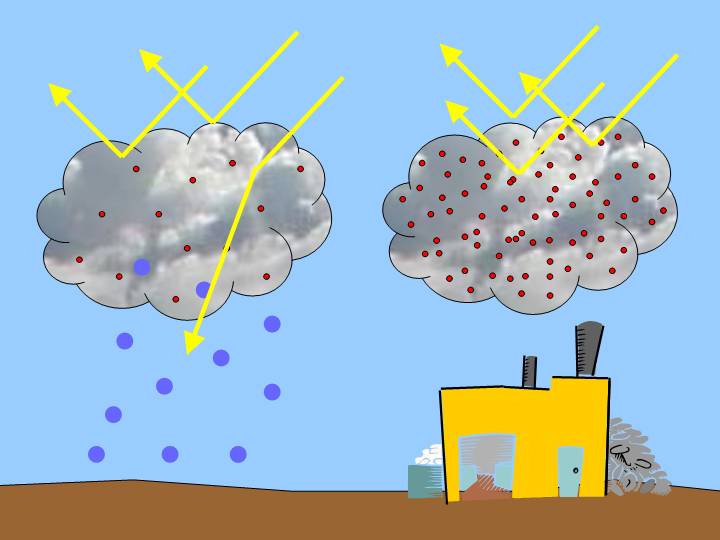 > English > Climate Encyclopaedia > Clouds and Particles > more > 3. Clouds, particles and climate > - Particles and climate
> English > Climate Encyclopaedia > Clouds and Particles > more > 3. Clouds, particles and climate > - Particles and climate
|
Clouds and particlesMore |
Particles and ClimateIn the Basics section on "Clouds and Climate" we saw that clouds affect our climate. Firstly, they reflect around 30% of the solar energy reaching our planet back into space. Secondly, clouds trap infra-red radiation from the Earth's surface and, as a result, help heat our planet.
|
|
But what role do particles have in the climate system? Do they modify the amount of energy reaching the ground in the absence of clouds? As they allow clouds to form, do they have an impact on cloud behaviour?
|
In 1783, a large volcanic eruption occurred in Iceland. The famous scientist Benjamin Franklin observed "a dry fog" over France, and hypothesized that the severe winter in Europe that year was linked to this "dry fog". A magnifying glass wouldn't even burn paper, he said. Franklin suggested that there was a reduction in the amount of solar energy at the Earth’s surface after the volcanic eruption. Similarly, extinction of the dinosaurs is thought to have resulted from a meteor impact 60 million years ago. It is believed that this massive collision injected such huge amounts of dust into the atmosphere that the Sun was completely obscured for several months and that this caused severe cooling of the Earth.
|
|
|
Simulations and observations after Mount Pinatubo erupted in 1991 have shown a global cooling of 0.5°C. The direct effect of particles on climate, through scattering of solar radiation, is likely to lead to global cooling.
|
|
Human influence on the direct effect of aerosolsBecause of industrial activity, burning of fossil fuels and forest fires humans emit large quantities of particles into the atmosphere. For example, a three kilometer deep pollution blanket known as the "Asian Brown Haze" stretches across South Asia, modifying weather patterns and endangering the health of hundreds of thousands of people. This mass of aerosols reduces the amount of solar energy reaching the Earth's surface by as much as 10 to 15%. But aerosols have also an indirect effect on climate. Our planet hasn't heard the last of humans... |
|
Figure 3. shows the indirect effect of particles: polluted clouds send more solar radiation back to space, and rainfall is inhibited because the cloud droplets are small. |
|
|
The relationships between particles and the albedo of a cloud are very complex so we are still unsure how important this indirect aerosol effect is to our climate. We are, however, sure that particles do play a very important role in the overall radiation budget of the Earth.
About this page....
|



